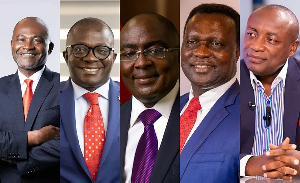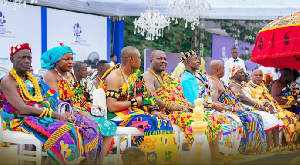By Nii Moi Thompson
The Black Stars may not have advanced to the semi-finals of this year’s World
Cup, but they sure went out in a blaze of glory, leaving in their trail not only
fond memories of world-class soccer but also many benefits and valuable lessons
for national and possibly even continental development.
From an economic standpoint, their inspirational (if anticlimactic) run in South
Africa bequeathed to Ghana and Africa a “growth effect” (short-term) and a
“development effect” (long-term).
As the Stars climbed from relative obscurity to prominence and ultimately became
the lone African representative in South Africa, businesses big and small, in
and outside of Africa, reportedly began cashing in. A vendor in Uganda reported
that customer interest had shifted from Ivorian jerseys to Ghanaian ones and
that he was having difficulty meeting demand. One can imagine similar scenes
across the continent.
Sports and drinking bars from Cape Town to Cairo raked in what probably amounted
to hundreds of millions of dollars in revenue as interest in the Black Stars’
exploits grew. Ghanaian and African shops in Europe, North America, and
elsewhere were not left out. Although many of the paraphernalia probably came
from China (but what doesn’t come from China these days?), there is no question
that beyond South Africa (the direct economic beneficiary of the World Cup), the
Black Stars helped provide a bounce for the many small businesses across the
continent. On balance, Africa in all likelihood will come out well-off,
economically, in part because of the Black Stars.
Indirectly, Ghana benefited from massive global name recognition whose full
economic benefit will unfold in the months and years to come yet. On the day
the Stars played the United States, for example, the word “Ghana” moved into the
top 10 searches for Google and later trended on Twitter, reflecting massive
global interest in the country. After the victory over the US, congratulatory
messages came in from as far away as Asia and the West Indies.
A BBC documentary on “History of Football” around the same time devoted a fair
amount of air time to soccer in Ghana dating back to 1922, when the Gold Coast
Football Association was formed (complete with bare-foot players). The
documentary also explains how Kwame Nkrumah later used soccer to promote
Pan-Africanism (including a 13-nil drubbing of the Kenya national team by the
Black Stars).
No amount of money can buy Ghana such world-wide publicity. The inevitable
curiosity will almost certainly follow: What is this little country that
produces so many world-class players at home and even abroad (the Boateng
brothers and Balotelli immediately come to mind)? How do they do it?
It will fall to the Ministries of Tourism and Sports to leverage any response to
these questions appropriately, creatively, economically. This is perhaps the
time to dust off the idea of a soccer museum and bring it to fruition, and to
strengthen a hospitality industry that is pitifully low on service but high on
price.
Merchandise exports should also benefit. Any item with the “Made in Ghana”
label on it should now attract more than a passing glance from many shoppers
around the world who had hitherto never heard of “Ghana”. But of course we’ll
first have to improve the quality of the products behind that brand to be able
to win and keep these new customers.
Which brings us to the “development effect” of the Stars’ accomplishments in
South Africa and the role of values in national development.
The Black Stars excelled because, unlike their forebears of recent years, they
had a set of positive values to shape their conduct and performance at all
times; those who violated them were promptly punished – impunity was never
tolerated and team cohesion and commonality of purpose were preserved.
Self-confidence, hard work, the pursuit of excellence, and respect for
authority were among the values that lifted the Black Stars to the heights they
attained.
At the base of these values was a deliberate program to identify and develop
talent for a formidable national team. In his recent autobiography, coach
Sellas Tetteh tells how he “nurtured and developed” players like Michael Essien,
the Gyan brothers, Sulley Muntari, John Paintsil, Kwadwo Asamoah, and Derek
Boateng, almost all of whom went to South Africa.
The lessons for the larger Ghanaian society cannot be over-emphasized. Values
such as a culture of excellence; respect for time; respect for law and order;
honesty; hard-work; dependability; and trust are the glue that holds a nation’s
development efforts together. Without them, much effort will be expended but
very little will be realized from it.
Pervasive lawlessness, for example, ensures that multi-million dollar highways
are turned into trotro stations or cluttered with open air markets for live
goats and chickens. The result is longer travel times, higher cost of doing
business, and declining global competitiveness, which ultimately translates into
low enterprise development, high unemployment and low incomes.
Indeed, ours is a society that thrives on costly impunity. Reckless motorists
drive or park anyhow with complete disregard for the inconvenience they cause
others or the damage they do to public property. Builders build anywhere, even
in water ways, when they know of the dire consequences in the future.
Politicians continue to use habitual lateness to public events as a measure of
their self-importance, crude a measure though that might be. Educational
standards have fallen to levels that clearly render the country non-competitive
in a global economy that treasures knowledge and technological knowhow. And
preachermen who should be citadels of virtue have rather become embodiments of
all that is wrong with the society: Materialism, which leads to greed, which in
turn breeds crimes and vices of all sorts.
Unlike the Black Stars, which punish impunity, the larger society accommodates
it, sometimes even rewards it – and the results are about us all to see. No
society has developed on the backs of such pervasive disregard for values and
standards, and there is no reason to believe that Ghana would prove to be the
exception.
The only alternative is to learn from the Black Stars and build the institutions
and systems that will add value, literally, to our economic and social efforts.
Otherwise ‘national development’ will remain elusive even as the Stars continue
to shine globally and universally.
By Nii Moi Thompson
niimoi@yahoo.com
Opinions of Thursday, 8 July 2010
Columnist: Thompson, Nii-Moi














